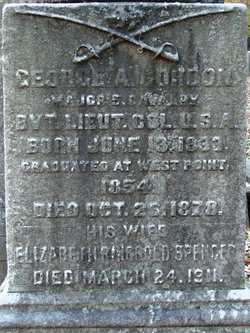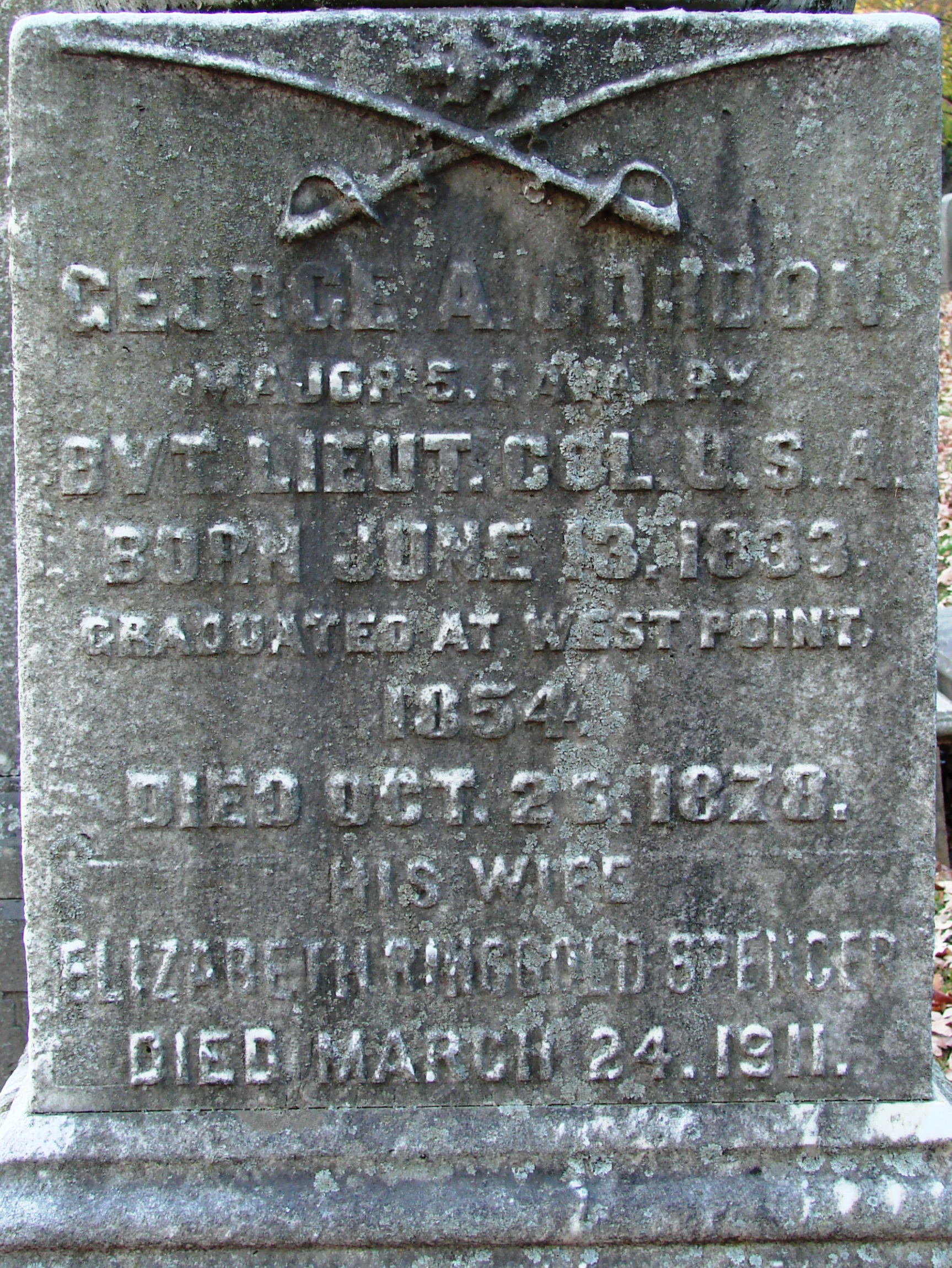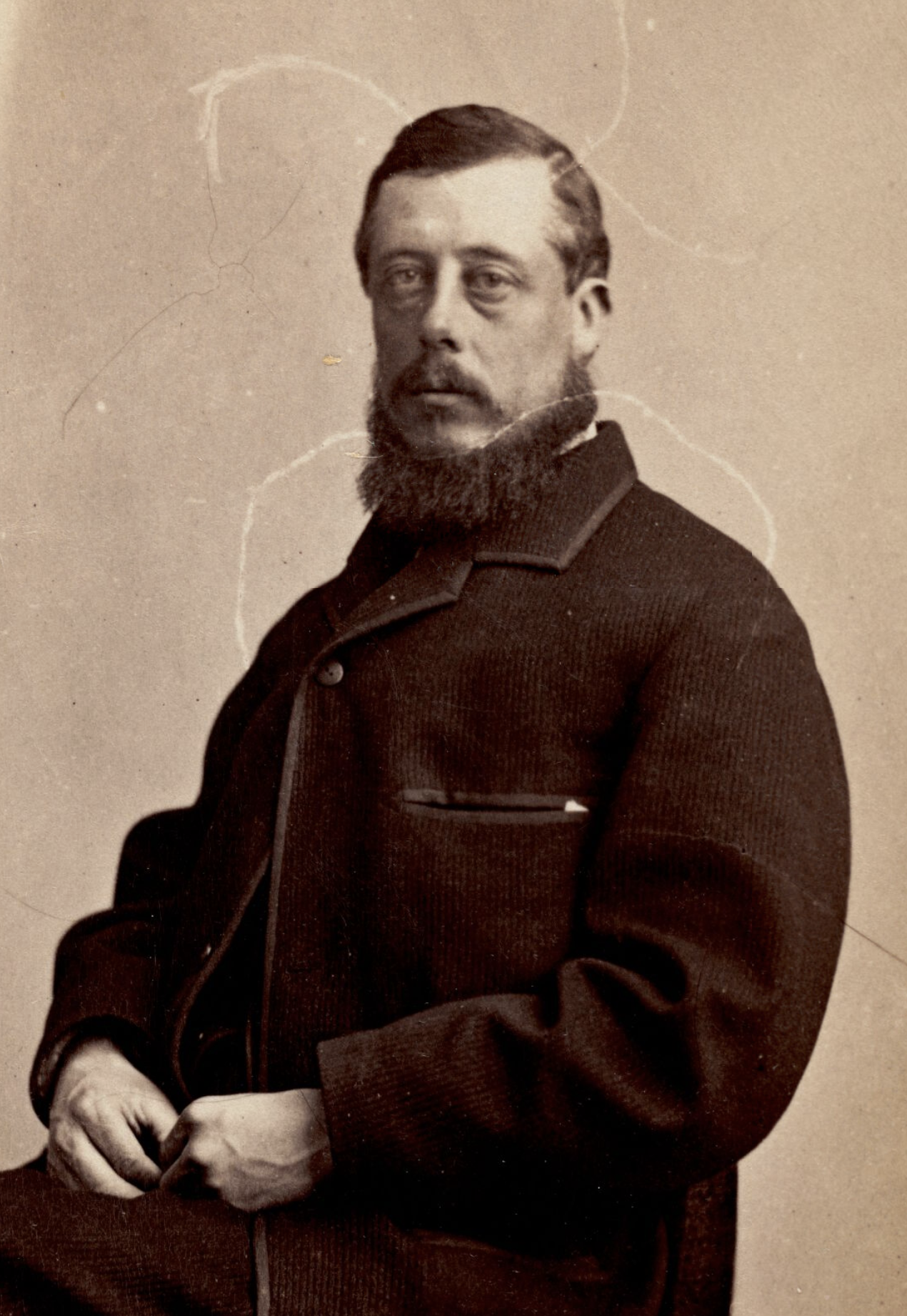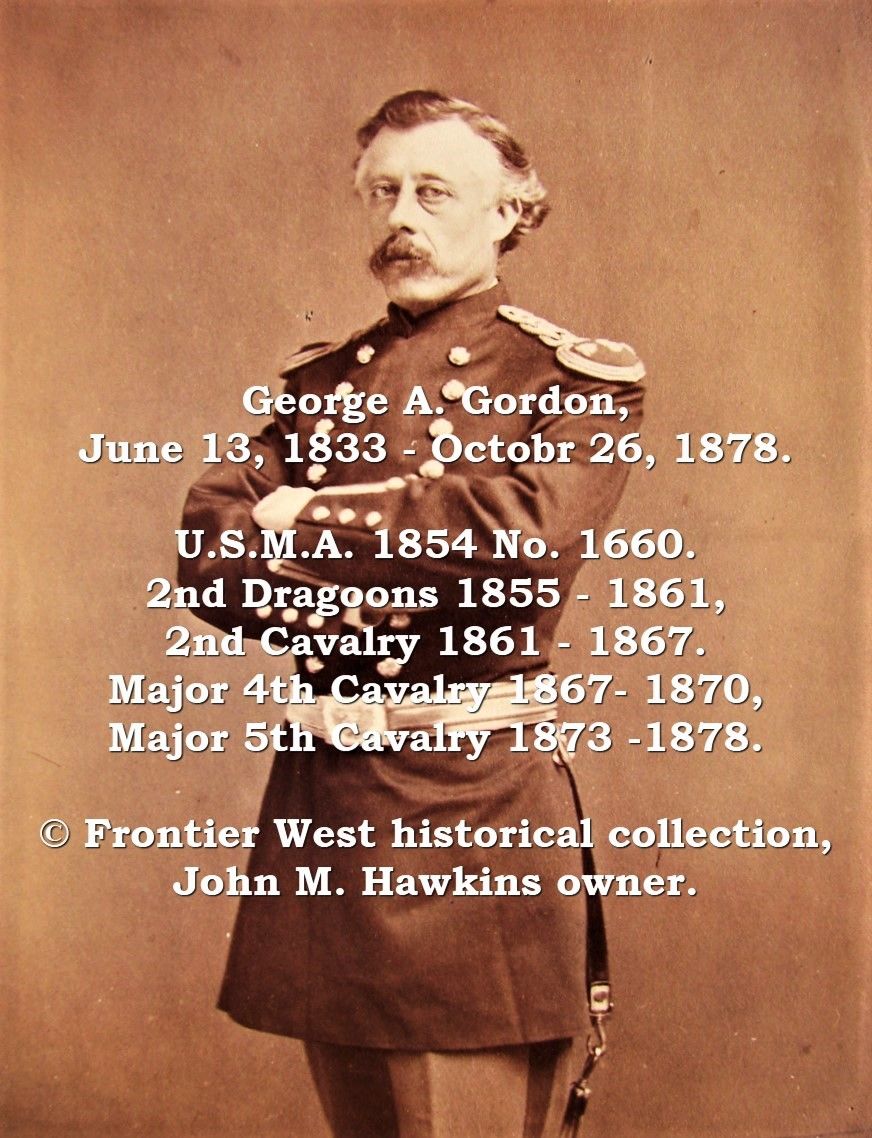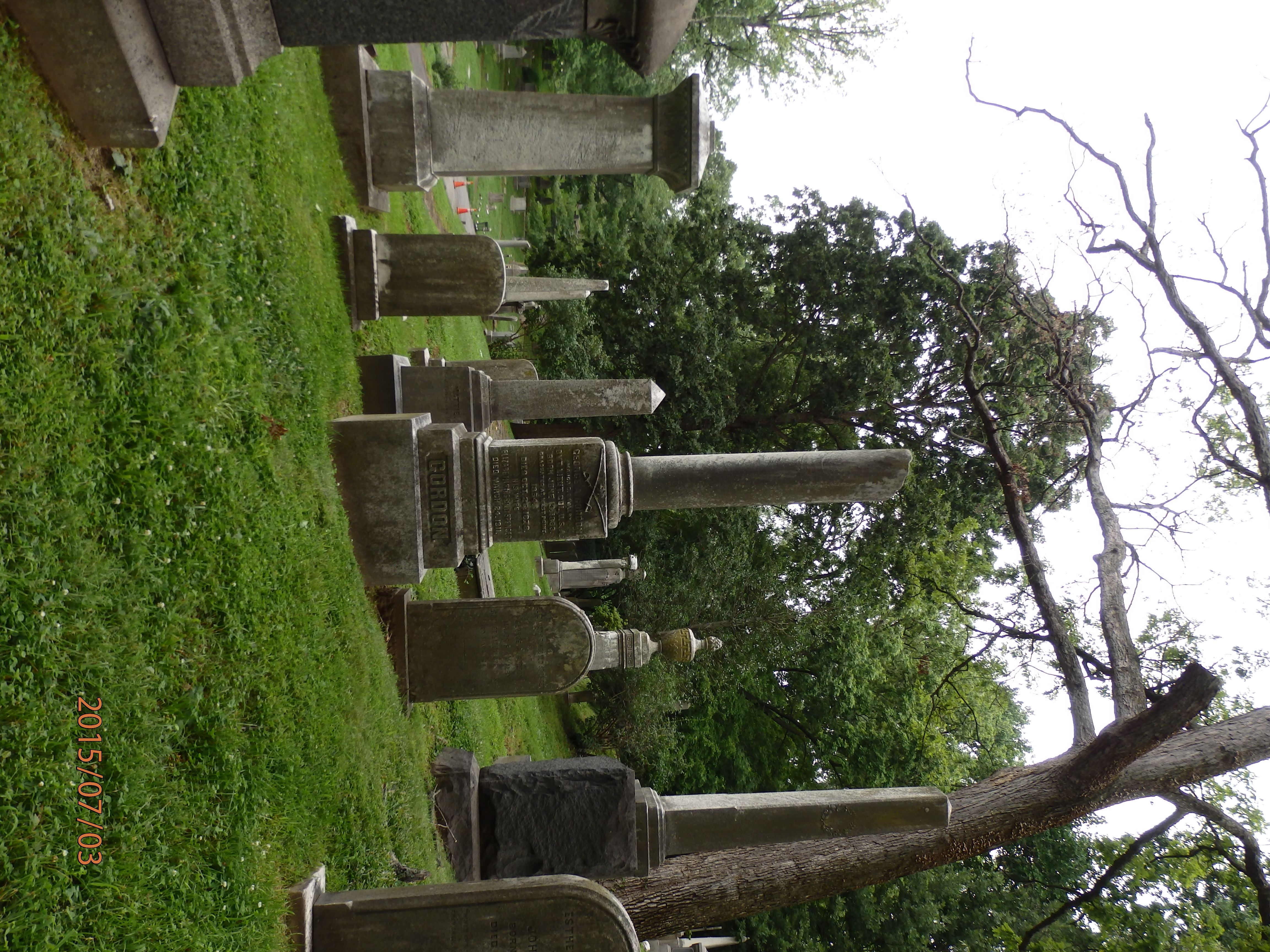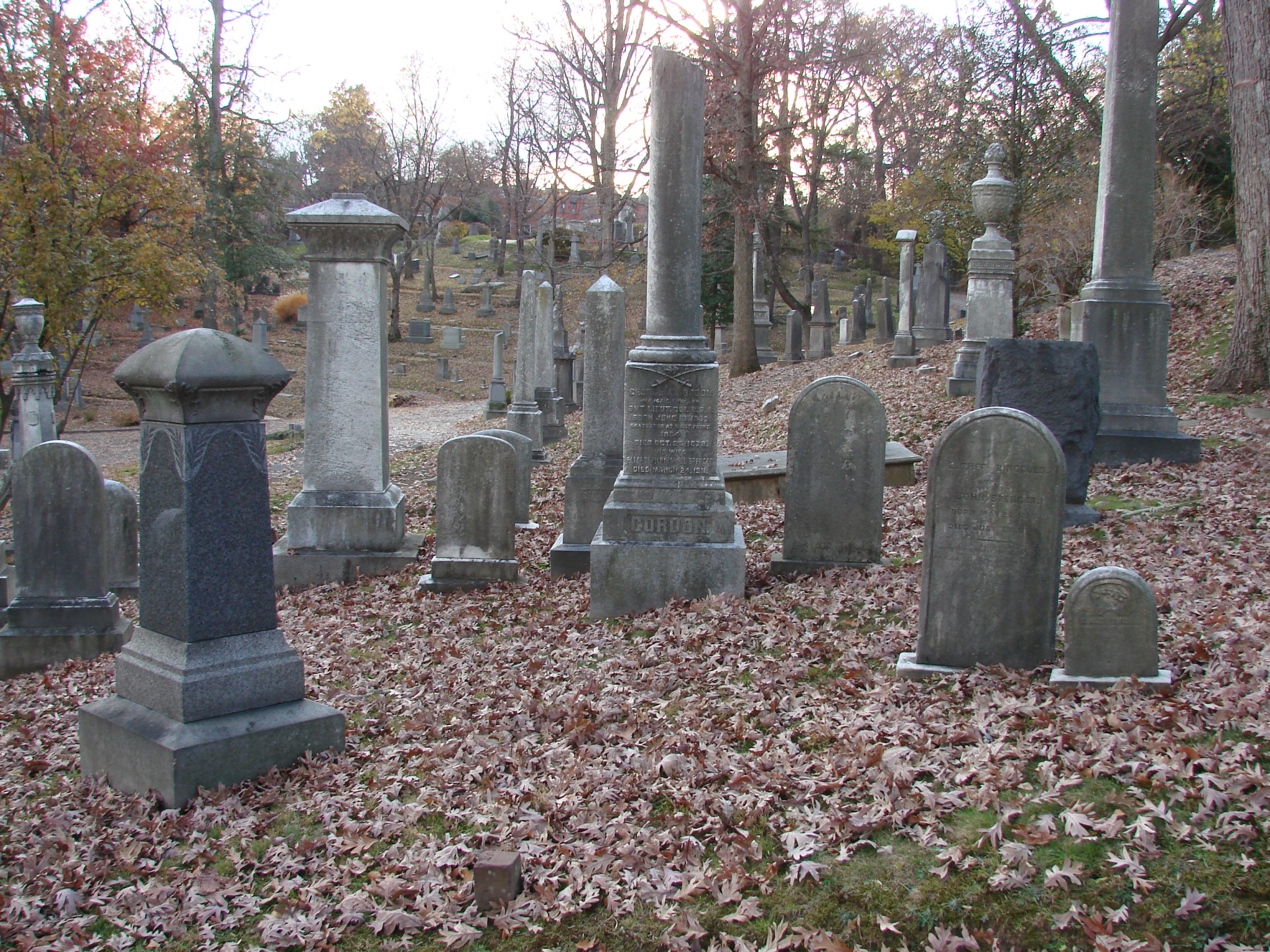USMA Class of 1854. Cullum No. 1660.
He was the son of Alexander George Gordon (1798-1849), Commander in the United States Navy and Amanda Taylor Gordon (1803-1833) of Dover, Delaware.
On December 17, 1874, he married Elizabeth R. Spencer in the District of Columbia.
They had no children.
Tenth Annual Reunion Of The Association Of The Graduates Of The United States Military Academy At West Point, New York, June 12, 1879, D. Van Nostrand, Publisher, New York, 1879.
George A. Gordon
No. 1660. Class of 1854.
Died October 26th, 1878, at Washington, D.C., aged 45.
Colonel George A. Gordon was born in Virginia A.D. 1833 and graduated at the Military Academy in 1854. He was appointed to a Second Lieutenancy, by brevet, in the artillery and after promotion to a Second Lieutenant in the 2d Artillery, was transferred at his own request, to the 2d Dragoons, which regiment he joined in 1855.
He served with his regiment during the Kansas disturbances and in 1857-1858 in the campaign against the Mormons. He remained in Utah with his regiment, making scouts and conducting marches in protection of immigrants, until August 1861, when the regiment returned to the States to take part in the War of the Rebellion.
The following extract from the order of the commanding officer of his regiment announcing Colonel Gordon's death, gives a succinct history of his military career during the Civil War: In 1861 he marched with his regiment from Fort Crittenden, Utah, to Washington, to take part in the War of the Rebellion against the seceding States, serving continuously in various positions of trust, until the surrender of the Confederate Army of Northern Virginia, at Appomattox Court House in 1865. He was promoted to a Captaincy in 1861 and breveted a Major for "gallant and meritorious services" in the battle of New Bridge, Virginia, in 1862. He took part, either as a regimental commander of staff officer, in almost all the important battles of the Army of the Potomac, on the Peninsula and in the Maryland and Pennsylvania campaigns; in all of which he received distinguished mention for gallant conduct. He also served with the cavalry during the operations under General Sheridan with the Army of the Potomac and in the valley of the Shenandoah, receiving the brevet of Lieutenant Colonel for gallant conduct at the Battle of Trevilian Station.
After the surrender of Lee's Army, he was detailed for special service with the cavalry expedition in the trans-Mississippi campaign, receiving the appointment of Inspector general of the cavalry in Texas. After the war he received his promotion as Major of Cavalry, serving with credit at all stations until a short month before his untimely death.
When the writer of this joined his regiment in Utah in 1860, he reported for duty in the company commended by the subject of this sketch. Gordon was then what he continued to be until his fatal disease found him at his post of duty, a faithful, zealous, thorough soldier.
Those were the last of the palmy days of the old Second Dragoons. Our regimental commander was general Philip St. George Cooke, who had gathered substantial honors as a soldier long before and added to them afterwards in the war. He commanded the Department of Utah. Buford was our squadron commander – that hero, whose purity and honor as a soldier and ability and bravery as a leader, will make his memory cherished by the generations to come. Then there was Saunders, who afterward fell, the hero of the day, at Knoxville and Villipigue, who reluctantly went South and finally died for the lost cause. Also, John Green, now Major of the First Cavalry and Beverly Robertson, who rose to the position of Major General in the Southern Cavalry. Battery B, of the Fourth Artillery, were our near neighbors at Fort Crittenden, with the talented and gallant Gibbon its Captain and for Lieutenants, Stephen Weed and Frank Beach, both of whom have since gone, young in years but full of honors to the other world.
And of all those close friendships, how dear to each of us was that with Gordon? Jake Gordon, as his genial jolly, reckless adventures caused him to be called. His stories, songs and jokes were the life of our circle. We never tired of them. His manner of relating a reminiscence was irresistible. While he violated the rule that a good story tellers should never laugh at his own jests, Gordon added to the zest by joining in and leading the laugh. His merriment was infectious; his sense of the ridiculous was irresistible and he never grew dull or tedious.
Yet with all his disposition to levity and fun, Gordon was one of the best officers in his command. He never neglected a duty. Early and late, in my experience, I found him attending to his work. He was an authority on any point in tactics, regulations or military law. He made it a point to learn what he did not know, to unravel what was mixed and intricate and he was never wrong on a mooted point or ignorant on one of importance connected with his profession. His popularity was a surprise to strangers, for he made no effort to make friends; but to those who knew him well, the affection he elicited on every hand was natural and caused no remark save that it was universal.
During the war Gordon was among the most excellent cavalry officers. Born in the South and receiving his early education under Southern auspices, in the times before the war, he naturally leaned to Southern ideas and took Southern views in abstract discussions of political questions. But when the first blow of the war was struck he chose his side without hesitation and adhered to it with a loyalty and warmth, which, if it was not confined to our Southern born officers, was certainly pre-eminent among them, harassed as they were, in most instances, by the importunities of friends in the South who sought to win them to the other side.
Our command was kept in Utah until August 1861. I can recall how all chafed at the delay in our orders for active service against the rebellious States. But it was before the railways and telegraph lines had reached those then distant frontiers and the mails were slow and uncertain. We reached Washington in October 1861 and at once commenced organizing and drilling with the Army of the Potomac. Many a young cavalry officer in the regular brigade can trace his early knowledge and skill in his profession to the example, advice and admonition of Gordon, who at that time, was first squadron Captain present with the 2d Dragoons.
Thus the great events of the war hurried on, so that in looking back at them they seem a vast dream – bright and vivid in parts, dark and indistinct in others – we see the brave young soldier, up in the thick of the right, on the dreary march or cheerless bivouac, always resolute and in earnest, though cheerful and light hearted – the model cavalry solider, who, if his character had been supplemented by a strong constitution, would have gained a solid worldwide glory, such as he had among his friends. But after all, it is scarcely a question if his is not the better fortune.
If He, who doth in secret see,
Approve our work, small need have we
Of earthly fame or eulogy.
Measured by the rule of the Great Master, Gordon's works were, no doubt, pronounced good. In all his stories there was nothing low or demoralizing, in his many songs there was nothing ribald or objectionable. In his social relations he was honest and faithful; he never volunteered an unkind remark nor did an ungenerous action toward any man.
During his entire life, after entering the army, he made monthly contributions to the support of a widowed sister and her little ones, whose husband and father had lost his life in another branch of the service and after his marriage, a few years since, to an estimable lady – the daughter of a naval officer – he developed new virtues in the domestic circle, which served to round out and complete the charm of a character which had so few defects.
(Brevet Major General Wesley Merritt.)
The Washington Post October 28, 1878
Gordon. On Saturday, the 26th instant, at the Ebbitt House, Washington, Brevet Lieutenant Colonel George A. Gordon, United States Army, Major, Fifth Cavalry. The funeral services will take place at the Chapel, Oak Hill Cemetery, Georgetown, today at 2:30PM. His friends are invited to attend.
USMA Class of 1854. Cullum No. 1660.
He was the son of Alexander George Gordon (1798-1849), Commander in the United States Navy and Amanda Taylor Gordon (1803-1833) of Dover, Delaware.
On December 17, 1874, he married Elizabeth R. Spencer in the District of Columbia.
They had no children.
Tenth Annual Reunion Of The Association Of The Graduates Of The United States Military Academy At West Point, New York, June 12, 1879, D. Van Nostrand, Publisher, New York, 1879.
George A. Gordon
No. 1660. Class of 1854.
Died October 26th, 1878, at Washington, D.C., aged 45.
Colonel George A. Gordon was born in Virginia A.D. 1833 and graduated at the Military Academy in 1854. He was appointed to a Second Lieutenancy, by brevet, in the artillery and after promotion to a Second Lieutenant in the 2d Artillery, was transferred at his own request, to the 2d Dragoons, which regiment he joined in 1855.
He served with his regiment during the Kansas disturbances and in 1857-1858 in the campaign against the Mormons. He remained in Utah with his regiment, making scouts and conducting marches in protection of immigrants, until August 1861, when the regiment returned to the States to take part in the War of the Rebellion.
The following extract from the order of the commanding officer of his regiment announcing Colonel Gordon's death, gives a succinct history of his military career during the Civil War: In 1861 he marched with his regiment from Fort Crittenden, Utah, to Washington, to take part in the War of the Rebellion against the seceding States, serving continuously in various positions of trust, until the surrender of the Confederate Army of Northern Virginia, at Appomattox Court House in 1865. He was promoted to a Captaincy in 1861 and breveted a Major for "gallant and meritorious services" in the battle of New Bridge, Virginia, in 1862. He took part, either as a regimental commander of staff officer, in almost all the important battles of the Army of the Potomac, on the Peninsula and in the Maryland and Pennsylvania campaigns; in all of which he received distinguished mention for gallant conduct. He also served with the cavalry during the operations under General Sheridan with the Army of the Potomac and in the valley of the Shenandoah, receiving the brevet of Lieutenant Colonel for gallant conduct at the Battle of Trevilian Station.
After the surrender of Lee's Army, he was detailed for special service with the cavalry expedition in the trans-Mississippi campaign, receiving the appointment of Inspector general of the cavalry in Texas. After the war he received his promotion as Major of Cavalry, serving with credit at all stations until a short month before his untimely death.
When the writer of this joined his regiment in Utah in 1860, he reported for duty in the company commended by the subject of this sketch. Gordon was then what he continued to be until his fatal disease found him at his post of duty, a faithful, zealous, thorough soldier.
Those were the last of the palmy days of the old Second Dragoons. Our regimental commander was general Philip St. George Cooke, who had gathered substantial honors as a soldier long before and added to them afterwards in the war. He commanded the Department of Utah. Buford was our squadron commander – that hero, whose purity and honor as a soldier and ability and bravery as a leader, will make his memory cherished by the generations to come. Then there was Saunders, who afterward fell, the hero of the day, at Knoxville and Villipigue, who reluctantly went South and finally died for the lost cause. Also, John Green, now Major of the First Cavalry and Beverly Robertson, who rose to the position of Major General in the Southern Cavalry. Battery B, of the Fourth Artillery, were our near neighbors at Fort Crittenden, with the talented and gallant Gibbon its Captain and for Lieutenants, Stephen Weed and Frank Beach, both of whom have since gone, young in years but full of honors to the other world.
And of all those close friendships, how dear to each of us was that with Gordon? Jake Gordon, as his genial jolly, reckless adventures caused him to be called. His stories, songs and jokes were the life of our circle. We never tired of them. His manner of relating a reminiscence was irresistible. While he violated the rule that a good story tellers should never laugh at his own jests, Gordon added to the zest by joining in and leading the laugh. His merriment was infectious; his sense of the ridiculous was irresistible and he never grew dull or tedious.
Yet with all his disposition to levity and fun, Gordon was one of the best officers in his command. He never neglected a duty. Early and late, in my experience, I found him attending to his work. He was an authority on any point in tactics, regulations or military law. He made it a point to learn what he did not know, to unravel what was mixed and intricate and he was never wrong on a mooted point or ignorant on one of importance connected with his profession. His popularity was a surprise to strangers, for he made no effort to make friends; but to those who knew him well, the affection he elicited on every hand was natural and caused no remark save that it was universal.
During the war Gordon was among the most excellent cavalry officers. Born in the South and receiving his early education under Southern auspices, in the times before the war, he naturally leaned to Southern ideas and took Southern views in abstract discussions of political questions. But when the first blow of the war was struck he chose his side without hesitation and adhered to it with a loyalty and warmth, which, if it was not confined to our Southern born officers, was certainly pre-eminent among them, harassed as they were, in most instances, by the importunities of friends in the South who sought to win them to the other side.
Our command was kept in Utah until August 1861. I can recall how all chafed at the delay in our orders for active service against the rebellious States. But it was before the railways and telegraph lines had reached those then distant frontiers and the mails were slow and uncertain. We reached Washington in October 1861 and at once commenced organizing and drilling with the Army of the Potomac. Many a young cavalry officer in the regular brigade can trace his early knowledge and skill in his profession to the example, advice and admonition of Gordon, who at that time, was first squadron Captain present with the 2d Dragoons.
Thus the great events of the war hurried on, so that in looking back at them they seem a vast dream – bright and vivid in parts, dark and indistinct in others – we see the brave young soldier, up in the thick of the right, on the dreary march or cheerless bivouac, always resolute and in earnest, though cheerful and light hearted – the model cavalry solider, who, if his character had been supplemented by a strong constitution, would have gained a solid worldwide glory, such as he had among his friends. But after all, it is scarcely a question if his is not the better fortune.
If He, who doth in secret see,
Approve our work, small need have we
Of earthly fame or eulogy.
Measured by the rule of the Great Master, Gordon's works were, no doubt, pronounced good. In all his stories there was nothing low or demoralizing, in his many songs there was nothing ribald or objectionable. In his social relations he was honest and faithful; he never volunteered an unkind remark nor did an ungenerous action toward any man.
During his entire life, after entering the army, he made monthly contributions to the support of a widowed sister and her little ones, whose husband and father had lost his life in another branch of the service and after his marriage, a few years since, to an estimable lady – the daughter of a naval officer – he developed new virtues in the domestic circle, which served to round out and complete the charm of a character which had so few defects.
(Brevet Major General Wesley Merritt.)
The Washington Post October 28, 1878
Gordon. On Saturday, the 26th instant, at the Ebbitt House, Washington, Brevet Lieutenant Colonel George A. Gordon, United States Army, Major, Fifth Cavalry. The funeral services will take place at the Chapel, Oak Hill Cemetery, Georgetown, today at 2:30PM. His friends are invited to attend.
Family Members
Advertisement
Explore more
Sponsored by Ancestry
Advertisement
